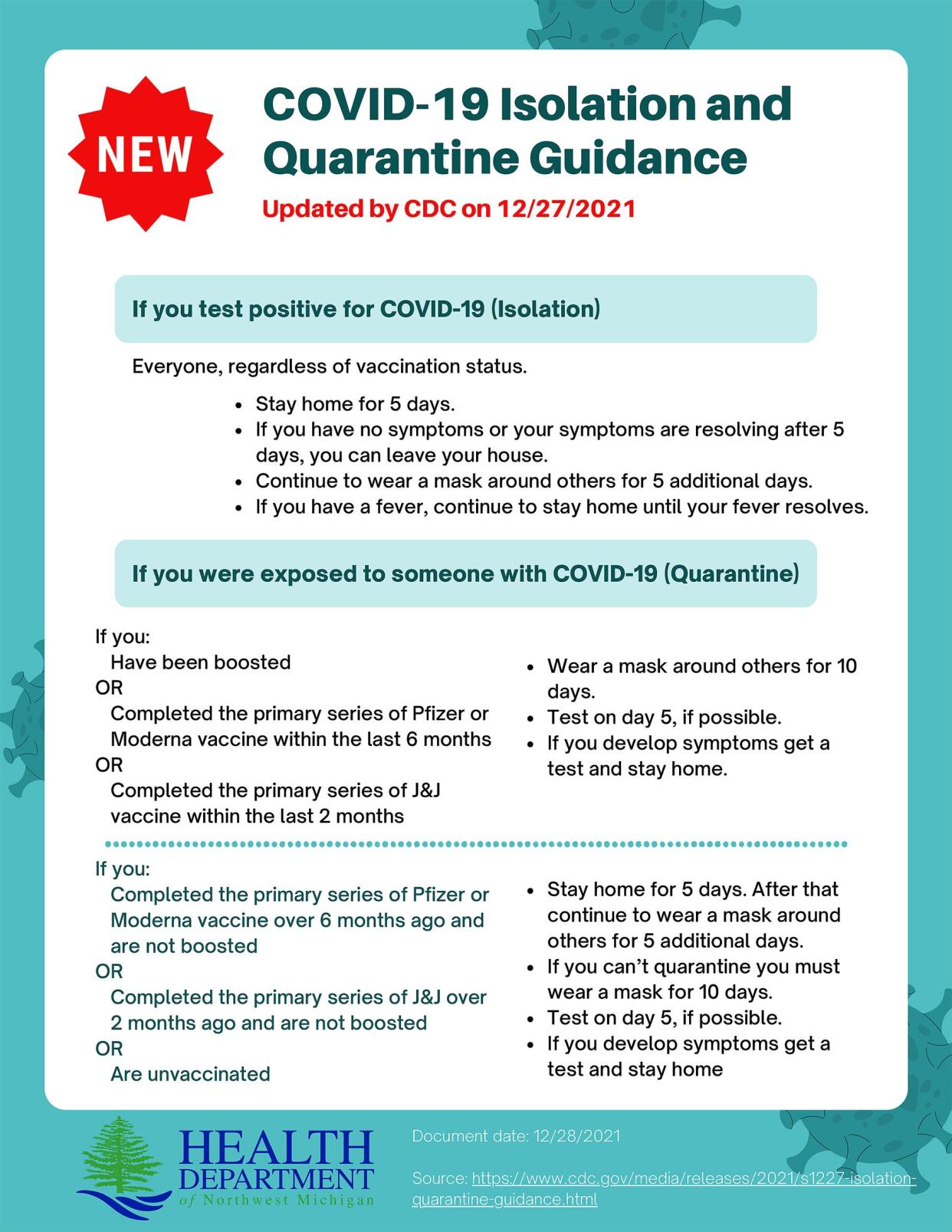New quarantine, isolation strategies adopted by Health Department of Northwest Michigan

Following guidance from the U.S. Centers for Disease Control and Prevention and the Michigan Department of Health and Human Services, the Health Department of Northwest Michigan announced recently it is adopting the strategy released by the CDC for quarantine and isolation effective immediately.
According to a CDC news release, given what is known about COVID-19 and the Omicron variant, the CDC shortened the recommended time for isolation from 10 days for people with COVID-19 to five days, if asymptomatic, followed by five days of wearing a mask when around others.
The change is motivated by science demonstrating that the majority of SARS-CoV-2 transmission occurs early in the course of the illness, generally in the 1-2 days prior to the onset of symptoms and the 2-3 days after, according to the CDC.
As a result, people who test positive should isolate for five days and, if asymptomatic at that time, they may leave isolation if they can continue to mask for five days to minimize the risk of infecting others.
Additionally, the CDC updated the recommended quarantine period for those exposed to COVID-19. For those people who are unvaccinated or are more than six months out from their second MRNA dose (or more than two months after the Johnson and Johnson vaccine) and not yet boosted, CDC now recommended quarantine for five days followed by strict mask use for an additional five days. If a five-day quarantine is not feasible, it is imperative than an exposed person wear a well-fitting mask at all times when around others for 10 days after exposure.
Individuals who have received their booster shot do not need to quarantine following an exposure, but should wear a mask for 10 days after the exposure. For all those exposed, best practice would also include a test for SARS-CoV-2 at day five after exposure. If symptoms occur, individuals should immediately quarantine until a negative test confirms symptoms are not attributable to COVID-19.
"We know these changes may be confusing and people may have unanswered questions at this time," said Lisa Peacock, health officer with the Health Department of Northwest Michigan. "It will also take the state and local health departments time to update documents on their websites and other printed materials.

"We ask for the public's patience as we, too, adapt to these new quarantine and isolation strategies," Peacock added. "In the meantime, we urge you you make good decisions for your health, and the health of your family and community members."
Peacock also emphasized the importance of being vaccinated, getting your booster and wearing a well-fitting mask.
"The key to these new quarantine and isolation strategies released by the CDC is to follow good preventative measures — and that means getting vaccinated including your booster shot, maintaining a safe distance from others and wearing your mask," Peacock said.
The Health Department of Northwest Michigan defined isolation as the behavior after a confirmed infection. Isolation for five days followed by wearing a well-fitting mask will minimize the risk of spreading the virus to others.
Additionally, quarantine refers to the time following exposure to the virus or close contact with someone known to have COVID-19. Both updates come as the Omicron variant continues to spread throughout the U.S. and reflects the current science on when and for how long a person is maximally infectious.
Last week the Michigan Department of Health and Human Services and Michigan Department of Education announced they would be sending letters to superintendents urging schools to reinforce actions that can help alleviate the risks associated with the pandemic — particularly in anticipation of the highly transmissible Omicron variant.
The guidance is intended to keep school buildings open and allow students and staff to return to school safely this week after winter break.
"Our priority has remained keeping students safe," said Michigan Department of Health and Human Services director Elizabeth Hertel. "Children ages five and older now can get vaccinated. In addition to vaccination, we strongly recommend universal masking for students, teachers and staff. We have the tools to keep Michiganders safe, and we must continue to use them."
The state health department is also recommending regular testing in all school settings. Frequent testing can help identify infected people, including those without symptoms who may be contagious, so measures can be taken to prevent further transmission or outbreaks.
To support schools that incorporate COVID-19 testing into their safer school prevention plans, the state health department is offering rapid antigen testing to K-12 schools through the "MI Safe Schools Testing Program."
For more information, visit nwhealth.org.
This article originally appeared on The Petoskey News-Review: Health department to follow new COVID-19 CDC guidelines

